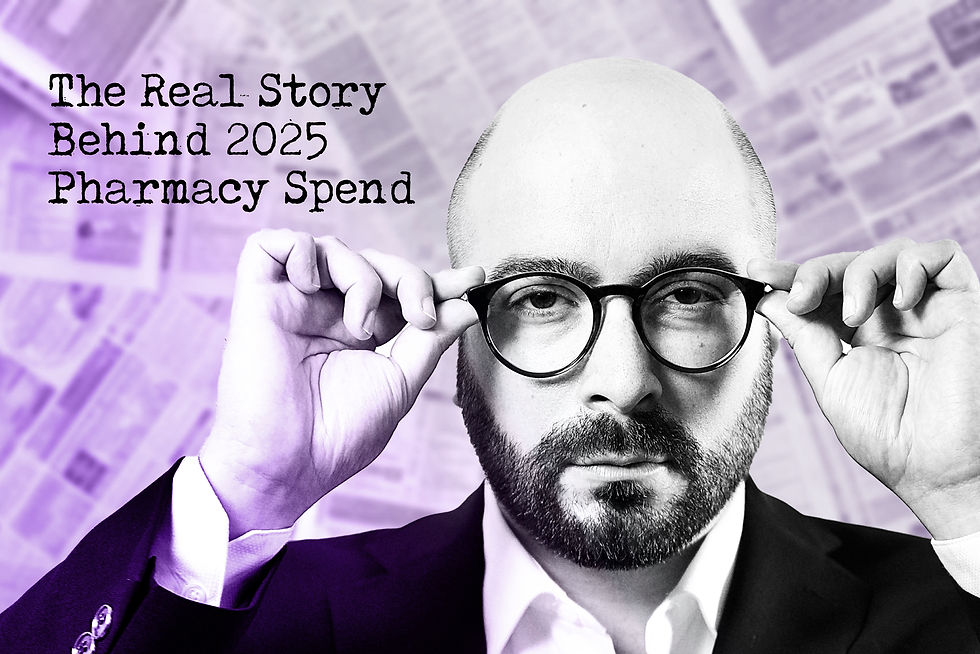We Put Mark Cuban in the Hot Seat: What Plan Sponsors Need to Know
- Scripta

- Nov 21, 2025
- 3 min read

Mark Cuban always tells it straight – and he certainly did that during our recent fireside chat with CEO Eric Levin.
He cut straight to the chase: the chaos in pharmacy benefits is not accidental, but self-insured employers have more power than they think. By making the right moves, plan sponsors can change the status quo and drive serious Rx savings.
Here are the five most actionable steps to act on today.
1. Ask for Cash Pay Purchases to Count Toward Deductibles
For self-insured employers, you can contractually require that any cash pay purchase applies to member deductibles. This removes the biggest barrier to cash pay adoption—members worrying their out-of-pocket spending won't count.
Add this requirement to your next contract negotiation. In Texas and Tennessee, it's already the law. Work with your consultant to ensure this language is included in your contracts.
2. Prioritize Biosimilars as Low-Hanging Fruit
Cuban calls biosimilars "the lowest hanging fruit." For example, the brand name Stelara costs $125,000/year, while the biosimilar Starjemza is just $1,240/year.
Review your plan design immediately to identify available biosimilar alternatives for your members. With Humira, Prolia, and other biosimilars entering the market, the savings are too significant to ignore.
3. Demand Full Audit Rights in Your Contract
Of all the companies Cuban has talked to that audited their claims, none have been overpaid in rebates—not one. Every single one has been underpaid or overcharged.
Make sure your contract includes rights to audit all claims with an auditor of your choice – not just the sample claims or auditor your PBM provides. When employers simply mention auditing, PBMs often immediately increase rebates. That tells you everything you need to know.
4. Start Small with Strategic Carve-Outs
If you’re worried about disruption, the good news is that you don't need to do a complete 180. Cuban recommends starting with targeted carve-outs for high-cost medications where cash pay offers dramatic savings.
Start by asking your PBM to add transparent pricing options like Cost Plus Drugs to your network for specific high-cost drugs. If they refuse this simple request, it's a sign that incentives may not be aligned. Using this approach builds confidence before considering larger changes. Pharmacy navigation tools like Scripta seamlessly integrate these options into your existing benefits design.
5. Use AI to Decode Your Contracts
Put your contracts through AI tools like ChatGPT, Gemini and Perplexity to pinpoint problem areas, percentage-based fees, vague fee language, and areas where you lack transparency. It’s a helpful way to find different perspectives if reviewing multiple contracts. While not perfect, AI can help time-strapped HR and benefits pros ask better questions and spot red flags.
The Bottom Line
While certain parts of the healthcare system are complex, the good news is that the financial part is something plan sponsors can control. With transparent pricing, biosimilars, cash-pay options, and the actionable strategies outlined here, self-insured employers can start making meaningful changes today. You don’t have to do everything at once – gradually implementing them over time will strengthen your plan, create paths to prescription savings, and help you better advocate for your members.
Ready to hear all of Mark Cuban’s straight and honest answers? Watch the full fireside chat – available now on demand. Together, they sound off on cash pay, direct-to-consumer pharmacy, TrumpRx and answer real questions from self-insured plan sponsors.




Comments